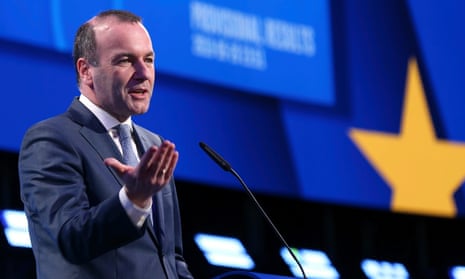Paris and Berlin appear on a collision course over the replacement of Jean-Claude Juncker as president of the European commission after poor results for the centre-right in the European elections damaged Angela Merkel’s choice for the post.
The German chancellor’s backing for the German MEP Manfred Weber, who leads the European People’s party of which her CDU party is a member, is facing tough resistance from the French president Emmanuel Macron in the post-election jockeying for top jobs.
The EU heads of state and government, including Theresa May, are due to meet on Tuesday night to kickstart their discussions over the leadership of the bloc’s institutions after a set of election results that weakened the grip of the traditional centrist parties on the levers of power in Brussels.
The European People’s party (EPP) remains the largest in the parliament, but during a disappointing night its haul of seats plummeted from 221 in 2014 to 180, prompting Weber to concede that the “centre is shrinking”.
The Socialists and Democrats group’s 191 seats five years ago fell to 145 despite surprisingly strong results in Spain and the Netherlands, where they topped the polls.
It is the first time in 40 years that the two groups are not able to form a stable majority to allow them to carve up the top jobs and set the legislative agenda. The member states choice for commission president also requires endorsement by a majority in the parliament.
The big winners on Sunday were the Greens, up from 50 to 69 seats and the Alliance of Liberals and Democrats group with 109 seats, up from 67 five years ago due to the influx of France’s La République En Marche (La REM) and British Liberal Democrat MEPs.
On Sunday night, the Greens co-leader, the Belgian MEP Philippe Lamberts, said: “To make a stable majority in this parliament the Greens are now indispensable.”
The EPP, however, retains its position as the largest group, prompting Annegret Kramp-Karrenbauer, the leader of Merkel’s CDU party, to insist on Monday that Weber was the “lead candidate and he is our man for European Commission president – and we have achieved this goal”.
Under the so-called spitzenkandidat system, which was used to appoint Juncker in 2014, the candidate of the largest party is expected to take the top commission post.

But Macron, who has long insisted he will not be beholden to that process, instead sought to steal a march on the centre-right on Monday by opening talks with the Spanish prime minister, Pedro Sánchez, in an attempt to form a “progressive alliance”. The two men were due to have dinner together in Paris on Monday evening.
Sanchez’s ruling Socialists came first in Sunday’s vote, a result he will likely use to wield more influence in the bloc. The Socialist party also scored big in local and regional elections, putting Sanchez in a stronger position as he seeks to form a new government following a general election on 28 April.
In a joint statement, Macron’s La REM and the wider Alliance of Liberals and Democrats political group, said: “The new balance of power in the European parliament calls for a commission president candidate that can build a robust majority way beyond the partisan lines. Our new group will be open to consider all candidates that can gather the support of the political families that will compose the future governing majority.”
A French government spokesman said: “The group that we are going to join is going to be a swing group which will try to be a driver in the creation of a progressive alliance. Why not with the Greens?”
In a sign of the difficulties in such a proposed deal, the Green’s Lamberts in turn claimed that Macron “couldn’t give a shit” about the environment in the wake of the elections.
The European commission’s German secretary-general, Martin Selmayr, insisted on Monday that there was no reason for the main political groups to do anything but follow the spitzenkandidat “lead candidate” process.
He admitted that there would need to be “patience” to allow the political groups to find an understanding, adding that he was convinced a replacement for Juncker would be found before a new Belgian government was formed, a famously difficult process made harder by voters in the national elections over the weekend flocking to both the extreme left and right.
Sunday night’s election results were also notable for some eye-catching victories for the populist far-right, including Marine Le Pen’s National Rally over Macron’s La REM in France and the 35% of the vote in Italy secured by the League, led by interior minister, Matteo Salvini.
Populists failed to win enough seats in Spain, the Netherlands or Germany to make themselves a real threat to the running of the European parliament, but on Monday Salvini insisted he could build a significant 150-strong bloc of MEPs.
Salvini told reporters in Milan that he was counting Nigel Farage’s Brexit party and Fidesz, led by Hungary’s prime minister, Viktor Orban, to leave their current groups and join the Europe of Nations and Freedom group.
The intention is to build on that with a group out of MEPs from far-right parties in the Czech Republic, Finland, Sweden, Denmark and Spain, “if everyone can overcome jealousies, sympathies and antipathies”, he said.
Greece’s prime minister, Alexis Tsipras, was left struggling for his political survival after his Syriza party, stung by austerity and a bitter rift over an accord with North Macedonia, suffered its first major defeat in years to the opposition conservative New Democracy party.
Smarting from the fallout, Tsipras said he would call snap elections, as New Democracy promptly demanded his resignation saying he no longer had a popular mandate. By law, the earliest the country could call elections is 30 June.
